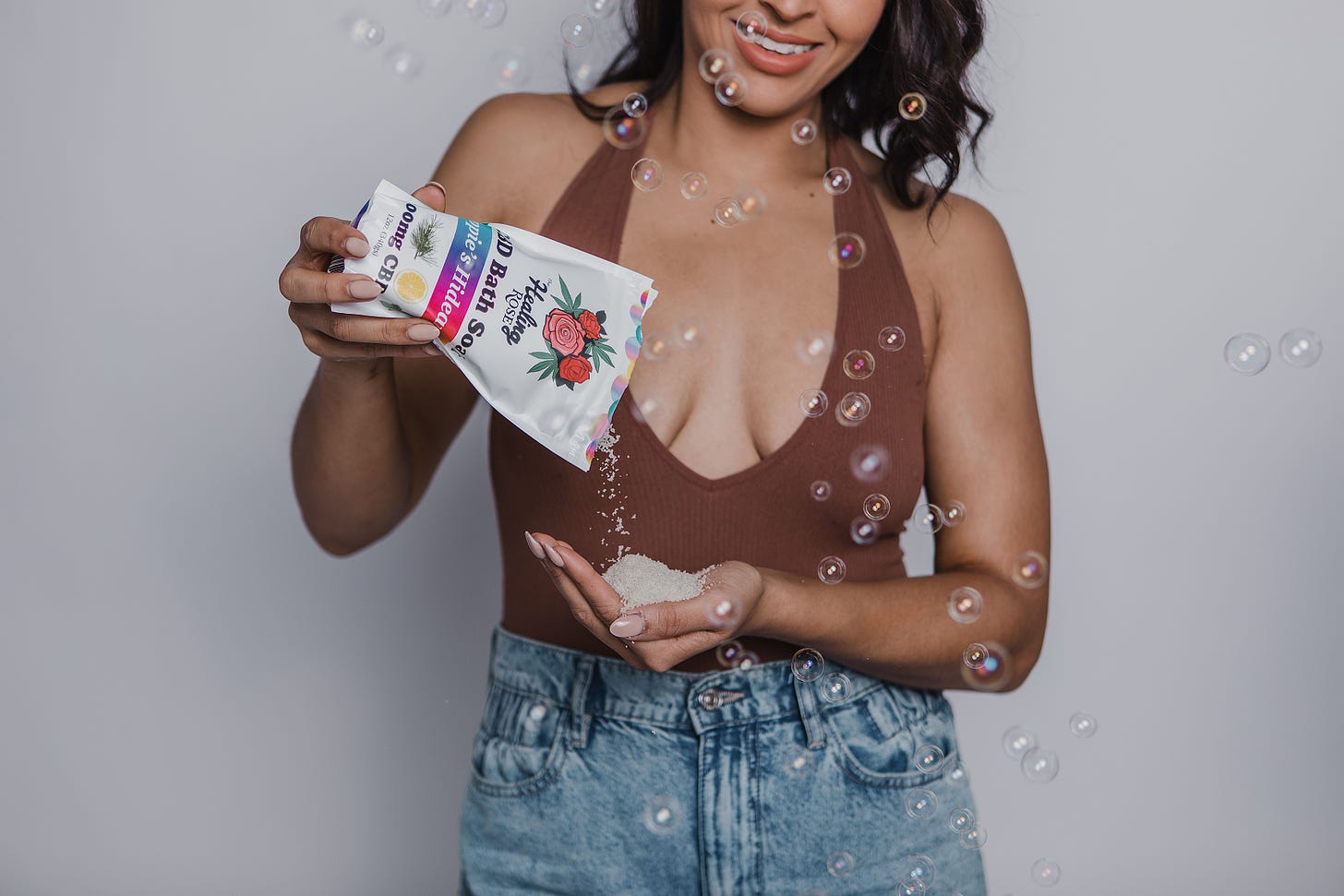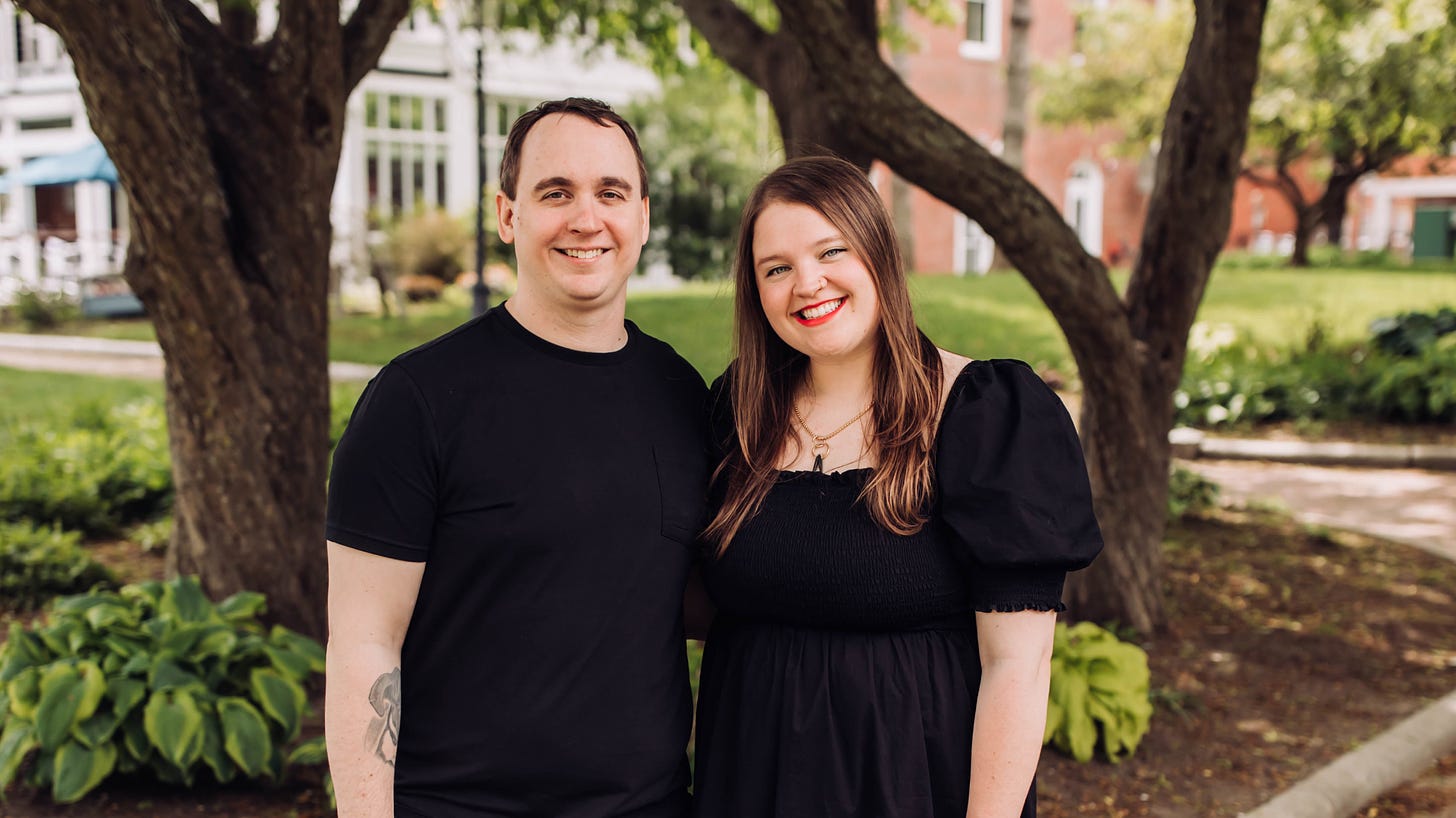The Healing Rose is Planning for a Future in Retail, Building on Grassroots Growth Strategy
Laura Beohner & Zach McInnis launched The Healing Rose just as Massachusetts legalized recreational cannabis. Consistent growth has required consistent strategy.
Laura Beohner remembers when design house Buy Weed From Women first made headlines in 2020. Advocating for “women entrepreneurs and the legalization of cannabis,” founder Jasmine Mans launched a movement and pushed back on the masculinization of an industry that saw the percentage of executive roles held by women fall from 37 percent in 2019 to just over 22 percent in 2021. Her bold style and activist messaging, however, inspired copycats.
“Some guys trolled MJBizCon with ‘Buy Weed from Rich White Men’ shirts,” Beohner told me in a recent conversation with Growing Season. She is a cannabis activist and the CEO of The Healing Rose, a CBD topicals brand based in Newburyport, Massachusetts. Beohner founded the company with her partner, Zach McInnis, in 2016, the same year the state legalized cannabis for recreational use.

“They’re just trolling, but they're also not lying,” Beohner said. The stunt touched a nerve in the industry. Trailblazers like Beohner are feeling the pressure from large, well-heeled multi-state operators (MSOs) in what is shaping up to be a “David-versus-Goliath” competition. Between 2019 and 2021, cannabis startups took in close to $4.5 billion in venture funding. “It’s quickly becoming a like every other industry. It does break my heart a little bit,” she said.
Today, network effects from established distribution channels, legal services, banking, and even digital advertising increasingly benefit new, well-funded entrants at the expense of pioneers whose campaigns for legalization and visionary entrepreneurship brought the industry to life.
To compete in a fast-maturing market, Beohner and McInnis are capitalizing on hard-won first-mover advantages, activating new growth tactics and customer touchpoints, and positioning The Healing Rose for a future as a conventional consumer brand.
First-Mover Advantage as Social Capital
“I always knew I wanted start my own business,” Beohner told me. After graduating from Northeastern University, she immediately leapt into activism with Women Grow Boston, advocating for women in cannabis and organizing for the 2016 Question 4 campaign, the ballot measure which would ultimately legalize cannabis in Massachusetts.
Soon, she found her niche. “I dislocated my kneecap that summer,” Beohner said. CBD salve took away the pain completely. “It was my light bulb moment. I just fell in love with this plant. I needed to be a cannabis entrepreneur,” she told me. That year, Beohner formed The Healing Rose with McInnis.
I felt like the potential for topicals was truly this huge gap in the market.
The brand was one of the first to bring CBD topicals to market in Massachusetts. “No one was talking about putting CBD on their skin,” Beohner said, though many veterans, older consumers, and people with chronic pain stood to benefit. “I felt like the potential for topicals was truly this huge gap in the market,” she explained.
As a first mover in the CBD market, The Healing Rose did not have access to the distribution and marketing networks in place today, but Beohner and McInnis dedicated themselves to relentless on-the-ground sales and marketing efforts in their community. “I am just one of those people that loves people,” Beohner said.
“We do a lot of work with veterans’ groups and just trying to show up in the community as much as possible. I'm always donating to raffles. We'll do CBD workshops at yoga studios,” she said. The balms, salves, soaps, and restorative oils that make up the catalogue at The Healing Rose caught on. “If someone’s like, what's the secret? It's a lot of work.”
I know once consumers try our products and meet us, they'll love us.
Years of consistent effort have paid off. Today, a personal connection differentiates the brand from new, well-capitalized startups that favor traditional marketing channels. It had to work: The Healing Rose still struggles with legacy advertising bans on social media, a result of building a business in cannabis before services and legislation caught up to the market. “It's a weird feeling because I see all these CBD companies coming into it now doing all these ads,” Beohner told me.
Grassroots marketing has become a brand moat for The Healing Rose, and finding new real-life consumer touchpoints remains a key growth strategy. “The best way to hear about a brand is by someone saying ‘I love this company; you need to try them,’” Beohner said.
“We’ve done markets, and we’re doing every convention we can. We just did a ski and snowboard show,” Beohner told me. “I'm always trying to get new touchpoints. I know once consumers try our products and meet us, they'll love us. I just keep doing it, and we just keep growing.”
Growth Tactics for a Maturing Market
As the cannabis industry matures, Beohner is ensuring that The Healing Rose evolves, too.
“I have a live chat on our website.” she said, explaining how The Healing Rose translated successful grassroots marketing into a digital growth strategy. “People can reach out to us 24/7, and if I catch it, I'll sit there and have heart-to-hearts with people.”
Live chat is a common tool for both B2B and B2C companies today and is consumers’ preferred method of communication with brands. Sixty-seven percent of consumer-oriented companies, however, still use live chat only for customer service rather than as a marketing channel.
“I just always tell myself touchpoints, touchpoints, touchpoints,” Beohner emphasized. It’s all about “making every customer feel special and creating that emotional bond. That's the route I've taken. I'm going to make people love us and advocate for us, and we’re going to make a difference in their lives.”
The company’s deeply personal strategy online meshes with a deeply personal strategy on the ground. “Creating that love and emotional connection is how we’re going to have longevity as a company,” Beohner said. In the future, that means growing thoughtfully into new marketing and distribution opportunities without sacrificing the valuable personal nature The Healing Rose has cultivated.
Planning for a Future in Organic Retail

With federal decriminalization of cannabis on the horizon, Beohner and McInnis are eager to take The Healing Rose national. “We’re certified organic here. Every single ingredient is certified organic,” Beohner told me. “I like to think that as we keep growing, we would one day have our products at Whole Foods.”
Like liquor, distribution channels for THC will likely remain discrete, but traditional health, beauty, and grocery retailers are already beginning to stock non-psychoactive hemp- and cannabis-derived products on their shelves. In 2019, CVS, Sephora, and Whole Foods were among those who announced they would carry CBD topicals, and just last year East Coast grocer Wegmans shared plans to sell CBD edibles in certain states.
“We can retain our small business feel and still deliver the same quality,” she said. “As we grow, it is so important to me that we still create the highest quality products we can.”
I like to think that as we keep growing, we would one day have our products at Whole Foods.
National expansion, however, is not a simple proposition for a regional brand like The Healing Rose. In Massachusetts, the Cannabis Control Commission (CCC) governs and licenses 11 types “marijuana establishments,” while the Massachusetts Department of Agricultural Resources (MDAR) regulates hemp. Navigating the overlapping legal scopes in the hemp and cannabis markets can be thorny and expensive for operators.
For her part, Beohner is hopeful for regulatory unification. “The future of this industry is really one. It’s inevitable because hemp and cannabis are all the same plant,” she told me.
“I do hope that the customers that have been ordering from us for five or six years will support us” in the transition from regional business to national brand, Beohner said.
While grassroots marketing sits at the heart of the brand, adapting to new distribution channels within a growing market is key to continued success. “We want to keep finding more of those people, keep growing, and find retail partners that will really let us expand that reach,” Beohner said.
Activism as a Growth Strategy
Consumers and business owners are equally eager for regulatory reform, justice, and a national market in cannabis. Unlike other regulated industries like pharmaceuticals, the industry is still maturing, and lobbying and activism efforts remain blended.
For The Healing Rose, getting in front of legislators is necessary for both survival and growth. Continued success as an ecommerce brand, product line extensions beyond topicals, and a national expansion strategy are all predicated on continued legislative refinement. Beohner does not sit idly by while state regulators sort themselves out.
Four years ago, when the state cracked down on hemp and CBD, she formed the Massachusetts Hemp Coalition to defend not only her livelihood, but those of the farmers, manufactures, brand builders, and retailers throughout the state’s budding hemp economy.
At the time, the coalition stated in a press release that the news came “at the worst possible time for farmers who have just invested tens of thousands of dollars in the new crop which is now growing for its first major season since prohibition was lifted in 2016.”
Working with other entrepreneurs and activists, “we were able to get a state budget amendment passed two years ago where we were able to sell into dispensaries. Prior to that, you weren't allowed to,” Beohner told me. Activism expanded opportunities in hemp and CBD, and helped The Healing Rose continue to grow. “More recently, they’ve allowed MDAR hemp extracts to be sold into dispensaries,” she said.
Creating that love and emotional connection is how we’re going to have longevity.
In 2016, the cannabis industry was still a wilderness, and very little of the infrastructure and investment available today existed to support entrepreneurs like Beohner and McInnis. That year, MJBiz wrote that “basic metrics such as annual revenue, profit margins and monthly operating expenses for cannabis businesses are difficult to come by” and “getting any type of reliable information within and across state markets can be an immense challenge.”
Activism and community-building efforts between entrepreneurs and their consumers created the cannabis market, and today, activism remains an integral part of growth strategy at The Healing Rose. Grassroots marketing, digital engagement, ecommerce, and planning for a future in national retail all rely on a strong, evolving, and intelligently regulated cannabis industry.
Looking to the future, Beohner is excited to build upon seven years of business and community leadership in the cannabis market. “We’re getting really scaled for growth,” she told me. “I just feel really, really positive about the future.”







